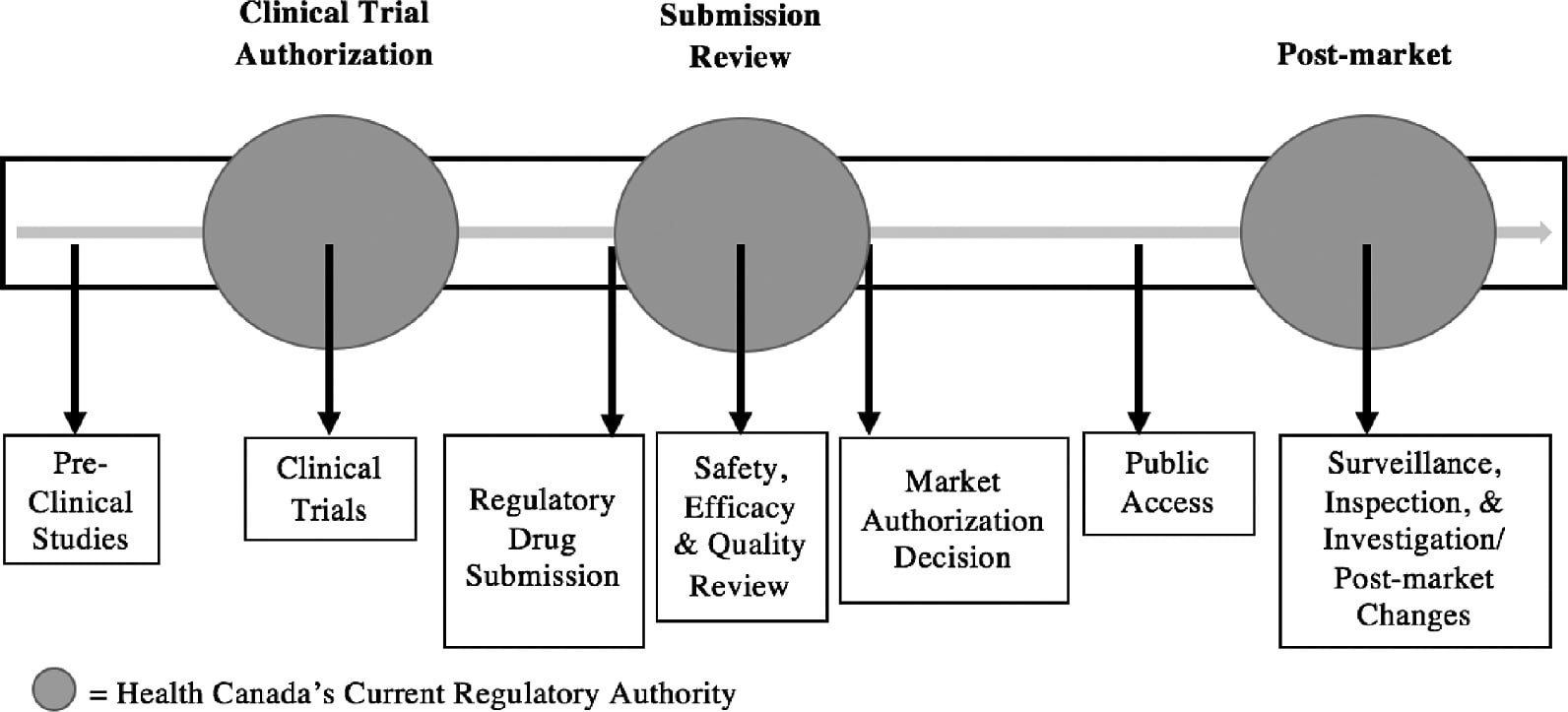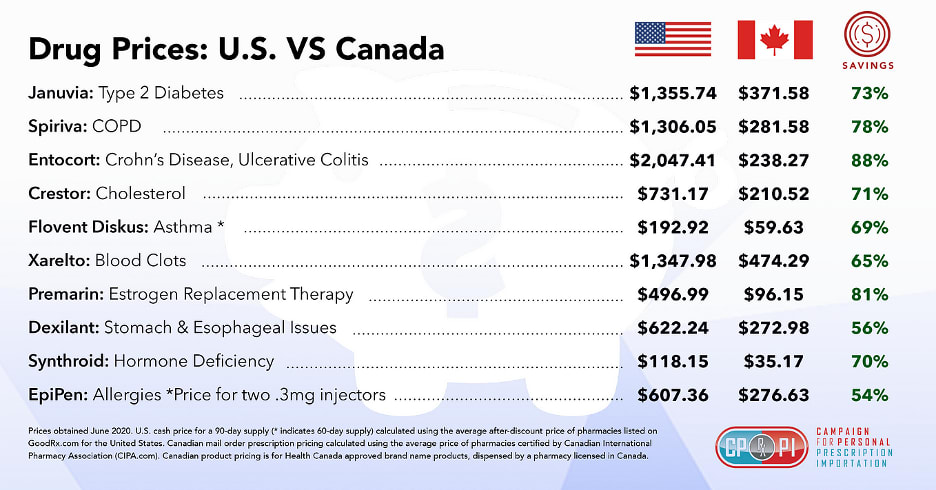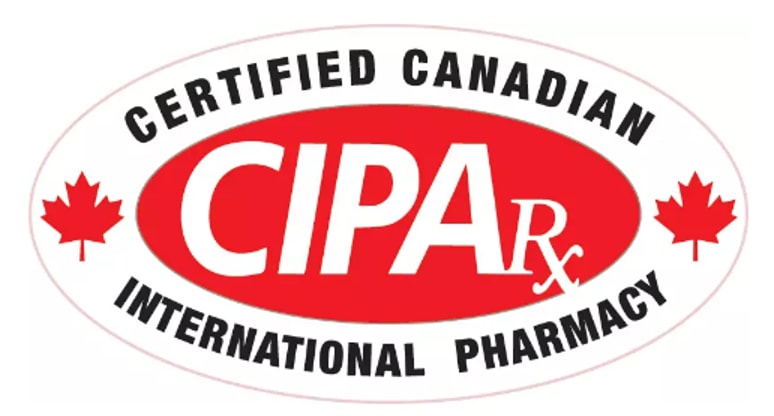Table of Contents
I. Overview of the Canadian Pharmaceutical Industry
II. Comparing U.S. and Canadian Drug Regulations
III. Common Concerns and Misconceptions
IV. Benefits of Canadian Pharmacies for International Patients
In the United States, where healthcare and prescription drug costs are skyrocketing, Canadian drugs have become a welcome and more affordable alternative. For individuals considering this path, important questions about the safety and efficacy of medications from Canada arise.
In this guide, we’ll cover everything you need to know about Canadian drugs and why they’re proven to be a safe option for patients in the U.S. and around the world.
Quick Takeaways:
- Canadian drugs are approved and regulated by Health Canada, and online Canadian pharmacies get extra oversight from the Canadian International Pharmacy Association.
- Top prescription drugs are anywhere from 54% to 90% more expensive in the U.S. than in Canada.
- Reputable Canadian pharmacies are CIPA-certified, require prescriptions, have pharmacists on staff, and ensure secure transactions.
- It is legal to order FDA-approved medications from Canada to the U.S. This includes generic drugs that may not yet be available on U.S. markets (ex: Eliquis).
Overview of the Canadian Pharmaceutical Industry
The Canadian pharmaceutical industry is well-established, with origins dating back to 1879. Over the course of this extended history, it’s evolved into a robust and highly regulated sector, providing safe and affordable Canadian drugs to patients around the world.
The industry is characterized by a commitment to innovation and accessibility while maintaining stringent safety standards in collaboration with Canadian and international health authorities.
Officially, Canada’s pharmaceutical industry is overseen by Health Canada. More specifically, the Health Products and Food Branch (HPFB) of the organization oversees the safety, efficacy, and quality of Canadian drugs and other therapeutic and diagnostic products, like medical devices and disinfectants.
The chart below shows the rigorous nature of Health Canada HPFB’s approval process for new Canadian drugs, which includes clinical trials, extensive safety and efficacy reviews, and continued surveillance and inspection after the drug becomes available on the market.

This regulatory environment ensures that medications available in Canada meet high standards for both safety and efficacy, fostering trust in Canadian drugs both domestically and internationally.
Comparing U.S. and Canadian Drug Regulations
In recent years, an increasing number of U.S. patients have sought out Canadian drugs rather than using their local pharmacies. In fact, one recent study found that across political party lines, Americans are in favor of developing policies that make it easier for Americans to purchase drugs from licensed Canadian pharmacies (75% of both Democrats and Republicans, and 82% of Independents). [2]

There are several drivers behind this shift. While the drug regulatory frameworks in Canada and the U.S. share a common goal of ensuring the highest safety and efficacy standards possible, there are notable differences in their structures, especially around drug pricing. In the United States, drug prices are largely determined by market dynamics. In Canada, there is a much more controlled system.
Canada’s Patented Medicine Prices Review Board (PMPRB) plays a central role in regulating drug prices and keeping them affordable without compromising on quality. The approval process in Canada also focuses on a broader range of generic alternatives compared to the U.S. In terms of safety surveillance, both countries have robust systems for monitoring drugs post-market, but Canada has more restrictive advertising regulations for pharmaceuticals.
Finally, the structure of the United States pharmaceutical, healthcare, and insurance industries can have an adverse effect on drug pricing and accessibility, making it more difficult for patients to access the medications they need at a reasonable cost. Today, U.S. drug prices are 54% to 88% higher than those of Canadian drugs, depending on the specific medication. [3]

Common Concerns and Misconceptions
Patients understandably encounter certain concerns and worries as they consider ordering prescription drugs from an international source like a Canadian online pharmacy. These concerns include the risk of counterfeit medications or even ordering from a completely illegitimate pharmacy.
While these worries are valid, they’ve also led to misconceptions about Canadian online pharmacies. By doing your research and taking the right steps prior to ordering Canadian drugs, you can be 100% certain you’re ordering from a reliable pharmacy providing safe medications.
The first step is finding an online pharmacy that’s been certified by the Canadian International Pharmacy Association (CIPA), which oversees online pharmacies and has a 100% perfect safety record over 30 years of operations. [4]
CIPA-certified pharmacies will have the CIPA logo displayed on their website (shown below), and you can look them up on the CIPA website as well.

Other indicators that a pharmacy is reputable and can be trusted include:
- Clearly publicized contact information, including a mailing address
- Licensed pharmacists on staff to answer medication-related questions
- Requirement to submit your prescription before order fulfillment
- Strict measures to secure all transactions, including data encryption
By knowing what to look for in Canadian pharmacies, you can make a confident decision about the one that’s best for you.
Benefits of Canadian Pharmacies for International Patients
The benefits of ordering from a Canadian online pharmacy are numerous and impactful for international patients. As already mentioned, Canadian drugs are significantly more affordable than those in the United States, with prices that are often lower even than those subsidized by private U.S. insurance. This means not having to compromise quality of life in other areas just to purchase needed medications.
Additionally, Canadian pharmacies offer a wider variety of medications, including many generic drugs that aren’t available in the United States. For example—generic Eliquis won’t be available in the United States until 2027 due to patent extension, even though it’s FDA-approved for safety. [5] But U.S. patients can get it from My Drug Center for a fraction of the brand-name Eliquis price in the U.S.
Finally, Canadian online pharmacies offer the convenience of at-home delivery, which is especially helpful for patients with mobility limitations or who live in remote areas.
Putting it All Together
Canadian drugs are reliable, safe, affordable, and legal to import to the United States as long as they have FDA approval. By ordering from a Canadian pharmacy, U.S. patients can access the medications they need more affordably and conveniently.
It’s important to take the right steps during the ordering process, including confirming a pharmacy has been certified by CIPA and provides the specific medications you need.
My Drug Center is a CIPA-certified Canadian pharmacy helping thousands of patients save up to 80% on their medications. We offer a wide range of popular prescription medications like Eliquis, Xarelto, Viagra, Cialis, Xifaxan, Jardiance, and more.
Visit the My Drug Center website to learn more about how to save on your next prescription.
The information in the article is not meant to be used for treatment or diagnosis. It is designed for general awareness and for information purposes only. Always consult a medical professional for your specific healthcare needs.
